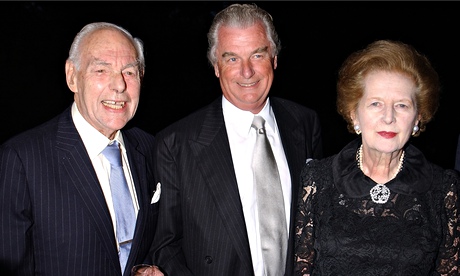
The most memorable election poster thus far this time round is memorably duff. “Let’s Stay on the Road to a Stronger Economy” with the Tories – via a straight stretch of (as it grotesquely happens) German tarmac. Think not so much mad as miserable men. But these are early days. There will surely be better pitches to pause over when Sam Delaney adds a 2015 chapter to his very entertaining memoir of the political ad squads who strive to tell Britain where to put its ballot paper cross.
Delaney pushes a slim thesis along this particular road. He seeks to reveal how a new breed of loud, louche, distinctly non-posh lads from the agencies took over and shaped politics in the 70s and 80s. Not a case that stands up to much scrutiny. The stars of his narrative – Jeremy Sinclair and Tim Bell from Saatchi and Saatchi, Chris Powell and John Webster from BMP, John Hegarty from Bartle Bogle Hegarty, even Sam’s uncle, Tim, from Leagas Delaney – are a socially mixed bunch of very bright men. They were hired hands called to the party colours to mix creativity with base calculation because – in the wake of JFK and Harold Wilson’s copycat “white heat of technology” revolution led by a transport union boss turned bemused minister (Frank Cousins) – Madison Avenue ways soon infected Westminster. Go to any US election convention during the past half century and you’ll see British party apparatchiks taking notes.
But, in fact, it doesn’t much matter whether Sam Delaney has got his big theme spot-on, because that’s not what gives his inquiries their fascination. For here, almost coincidentally in a long string of old campaigns remembered by those who commissioned and those who served, are some excoriating vignettes of the panic and incompetence that grips our once and future leaders when democratic decision time comes around. They aspire to run the country, but whelk stalls would probably be beyond them.
It’s 1979 and the greatest pollster of his era, Bob Worcester, is attempting to advise Percy Clarke, Labour’s director of communications, how to mastermind Jim Callaghan’s return to Downing Street. “He told me in no uncertain terms not to present a finding that the party wanted a party that represented all classes. We are the party of the working class! We don’t need the middle class.” (Oh yes! They did.)
It’s 1983 and Joe Wright has been brought in at short notice to burnish the Michael Foot profile against Mrs T. “But Labour HQ was utterly disorganised. There was no strategy and it was chaotic… We had to have every piece of work examined and signed off by about 40 different people on the campaign committee. It was like advertising hell.”
It’s 1987 and the Tories are suddenly unnerved by a single, rogue poll that puts a third Thatcher triumph in doubt. Chairman Tebbit and the rehired Saatchis are supposedly masterminding things from Central Office. David (later Lord) Young is over at Number 10, keeping the Lady calm: except she’s not. Young secretly gets Tim Bell (who’s fallen out with the Saatchis) and Frank Lowe, neither of whom has actually written an ad before, to rough out alternatives. “Who the fuck did these?” bawls Tebbit when he sees their dummies.
Young grabs Tebbit by his lapels and shouts right back. “Norman, listen to me, we’re going to lose this fucking election! You’re going to go, I’m going to go, we’re all going to go! It’s about the future of this flaming country!” Which is also the message that Jeremy Sinclair gave a neophyte Tory campaign director as he sought to rescue John Major from an early prime ministerial grave. “It’s very simple in this game: you either kill or you get killed.”
Perhaps much of the time, maybe almost all of the time, political ads don’t turn election tides. “The truth is that (in 1979) those posters had no impact whatsoever on the result: the election was decided, as always, by C2 women, the sort of people who don’t engage with posters at all,” uncle Tim Delaney tells young Sam. And if that was true 36 years ago, it’s probably truer still today as election supremos from Australia and Obama’s America are hired to play temporary masters of the political universe while digital messaging and TV debating relegate the big boards and snappy slogans. Tout ça change? Don’t believe it. The rumours of pending strife around Ed Miliband’s team would make poor old Percy Clarke mop his brow. The moment that George Osborne and David Cameron have a bawling lapel moment will surely arrive.
Sam Delaney, walking the walk and talking the talk, lays bare the everlasting brutal story about democratic politics – the one that lies beyond poster world. If you win, there’s no security next time. If you lose, there may be no next time. Brilliant advisers and snake oil salesmen equally welcome in the circumstances. Ego massaging and duplicity inevitable. Money, to be feverishly spent on something or other that may or not matter, perennially needed. Policies – a dreary balance of the economy and the NHS, repeated time after time – don’t change. And behind the wan smiles, sheer desperation is always with us.
- This article was amended on 7 February 2015 to remove an incorrect date.
Mad Men & Bad Men is published by Faber (£14.99). Click here to buy it for £11.99

